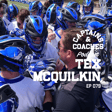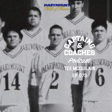Introduction and Guest Background
00:00:00
Speaker
Action! Welcome to another episode of the Captains and Coaches Podcast. Today I sit down with Brad Kennington, licensed marriage and family therapist. He has over 25 years of experience and specializes and is nationally recognized for his work with male eating disorders.
00:00:17
Speaker
He's worked with Olympians, professional athletes, Division I athletes, and beyond. We sit down and we get into the family systems and how Brad's understanding of family dynamics carry over to athletics. This is by far one of the richest, most exciting conversations that I've had. I did not want it to end.
00:00:39
Speaker
We talk about the relationship with sport, athlete to sport, and how having fun is so important, whether you're a kid all the way up to Olympian, and so much
Male Athletes and Eating Disorders
00:00:49
Speaker
more. We also deep dive into a special work with male eating disorders. If you're working with athletes, if you're a parent, this is an extremely valuable episode, and we certainly will have Brad back on the show. Until then, I'm excited to hand it off to him. Here we go, ready, ready, and break.
00:01:14
Speaker
Welcome to the show. Thank you for coming out to Dripping Springs. Glad to be here. Beautiful out here. Yes. this The Hill Country is something else. I'm here for life. So I'm happy to be here. Give us an elevator pitch. So you've had a ah fun journey in your career, and now you're doing awesome things with University of Texas and and beyond. So I want to paint that picture of your journey and where you stand today. I mean, you may start back in undergrad. Sure. I was okay so i went went to school at UT. Undergrad was more of a pre-law there.
00:01:47
Speaker
Uh, interested in going to law school, obviously, um, from 8th grade through UT, I want to be an attorney. Finished, um, UT spent 6 years working at the Capitol in Austin as a chief of staff for a state representative. I guess halfway through there, means yeah halfway through my term there.
Career Transition from Law to Therapy
00:02:09
Speaker
I realized um law may not be for me, so it's kind of an identity and crisis of sorts. And then Shifted Gears completely went into grad school, did not go to law school, went to grad school instead. and um original interest was wanting to work with children who were going through a traumatic grief, so like maybe a loss of a parent, sibling, even a pet. It was really fascinated by their resiliency, how children are resilient and they move through that. So most of my formal training is working with children. So I'm trained as a child therapist, working at an agency for a year, exactly a year after grad school,
00:02:53
Speaker
um there During that year, 9-11 happened, the economy tanked. I'd gone in on a three-year grant, year three of a three-year grant. So when my year was up, there was no money left to fund the grant and my position was eliminated because the economy was just in
Focus on Eating Disorders
00:03:11
Speaker
shambles. yeah and um So I went kicking and screaming to an intensive outpatient clinic in Austin.
00:03:20
Speaker
that specialized in eating disorders. And I say kicking in screaming, kicking in screaming. I had no interest in grad school and working with eating disorders, zero, none. And so when kicking and screaming was there maybe five or six weeks because it was a cash pay clinic. And of course, in a very weak economy, people were using their insurance. Right.
00:03:37
Speaker
So she brought on three therapists and she had let go two of us because there was no money. But I was there over six weeks long enough to have a new in interest spark. And I was really interested in what's going on in these family.
00:03:51
Speaker
systems where I'm trained as a marriage and family therapist. So I was i was really fascinated by what's going on in these families where one or maybe more than one person, they're throwing up, they're starving. Now what's going on here? yeah So I took that new interest and wetted it with an existing interest of wanting to work with guys. And then that sort of started working with body misissues and eating disorders with guys.
00:04:17
Speaker
And it I got it on the ground floor of that. I just took off. Yeah. And so then guys tend to use exercise as a gateway ah into eating disorders where, you know, females traditionally tend to use dieting. Does that mean that females can't use exercise and guys can't use dieting?
00:04:36
Speaker
but more the more traditional gateways are women, girls and women tend to use dieting as the gateway, and guys tend to use exercise.
Case Studies: Athletes and Eating Disorders
00:04:45
Speaker
That got me seeing athletes, folks who were more exercise-oriented, athletic, club sports. My youngest, actually my youngest eating disorder client was also a soccer player at age nine, and he was the restrictor.
00:05:01
Speaker
wow so One thing led to another. I joined a psychiatrist, I took my solo practice, merged it with the psychiatric practice here in town to help them develop their eating disorder practice area. Was there exactly a year left there to be an executive director of a treatment center just outside of Georgetown?
00:05:22
Speaker
It was a 14-bench facility. It was an overnight facility. um Another great recession that happened. The company was had basically bought the was being funded by private equity. And then when the financial markets were collapsing in 2007 to 2008, the private equity firm was running their money back, and it was going to put a house of cards. yeah And so then the company did not exist. So they closed.
00:05:51
Speaker
laid us all off, so here we go again. ah And so I went back into private practice and then I was recruited to come on board with an existing day hospital. It's called a partial hospital program um in Westlake, part of Austin, West Austin, and I was their executive director for about four years. I then left there and went back into private practice. Since then I have because I do some work contract, work with University of Texas Athletics. I am on private practice. I do some consulting work with treatment centers in the area for eating disorders as well. and So um that's where I am. That's awesome. yeah Yeah. Eating disorders with male athletes, that ah that is something is interesting that is directly connected to that behavior. I'm talking to you, Dave, about sports because of my interest in working with eating disorders with guys. Yeah. And there are certain sports that are higher risk.
00:06:47
Speaker
And so I get anything with endurance, you think swimming, riding, cycling, and then diving. um vin I've seen i've seen i've said eating some guys but guys with eating disorders in these non-traditional sports as well too, but certain certain sports are higher risk. ah yeah it was It was because of eating disorders and I'm not talking with you about sports.
00:07:14
Speaker
Here I am. Been a long road, but it's... Very, very circuitous. It's all connected. Yes.
Risk Factors and Genetic Links
00:07:19
Speaker
And you said nine years old, that's the youngest, but then there's issues leading up to even adults still challenging here. So former athletes, I imagine, but then the the behavior is still embedded somewhere and they still coming to you for help. Yeah. And and um in some of these aspects of guys I've worked with, even female athletes, it's the the sport culture can serve as a petri dish of sorts. Some sports are, like I said, at are higher risk for developing these things. Also, certain uniforms are more revealing. That can definitely trigger body image. You look at me think of swimming. it's It's kind of a perfect storm scenario, for instance. You've got a very revealing uniform coupled with high endurance. Yeah.
00:08:07
Speaker
so Now, it doesn't mean everybody who's in that sport has an eating disorder by any of these issues, no. But if you're predisposed to it, if you've got the temperament, so there's definitely a genetic component to eating disorders, and the genetic component is the temperament. So you think of a personality atop somebody who is very sensitive, perfectionistic, very driven,
00:08:30
Speaker
ah people pleasing, more prone for anxiety. You take that personality type and you put them in certain environments, including a particular sport, it can pop. Yeah. and then It will, but it can. A lot of those are praised, those character traits. Yes. Yes. In our society in general. And so it's the comments are, you the bill you look great because you've lost weight, all these charged comments in our society.
00:09:00
Speaker
And are eating disorders, are they typically connected to an event? So something that sparks and then you're using this to endure? You know, it's not my quote, but one of the researchers, he likes to say, I can't even get his name, but he's on California, not my quote. He goes, genes load the gun and the environment pulls the trigger. Well, I like it.
00:09:27
Speaker
And so I like to think in terms of like, say a but ah a bag of popcorn. So you throw a popcorn bag in the microwave, you you hit it for two minutes, whatever. Some kernels pop immediately. Some take a minute. Some take a minute 30. Some never pop. yeah But, you know, I think in terms of, you know, some people of had the temperament and there can be an event and they don't develop eating disorder or they they develop disordered eating and they move through that without developing a full blown eating disorder. Some pop early.
00:09:56
Speaker
You know, some it could be just one comment from a parent, a peer, a coach, and boom, it pops. Some it may take years of that. But there's definitely an environmental piece to this. there's So there's the the ah temperament, the personality, which is the which is the um genetic component. And you put that type of personality, in particular, a culture or a context or an environment, including some sports, and it can pop.
00:10:24
Speaker
and Yeah, I think ah focus a lot of time on transition periods for athletes. So whether that's eighth to ninth grade, JV to varsity, and then the biggest jump that we see high school to college yeah in terms of performance. Well, you just get a key where there's transition. So transitions are often a period, a context in which these things occur.
00:10:47
Speaker
And so we see a lot of them happening with with adolescents and young adults. They're growing from middle school to high school, high school to college, college to the real world, so to speak.
Spectrum of Eating Disorders
00:10:56
Speaker
And then by by the time they're sitting with you, something's already full blown. They need assistance. Yeah. so yeah Well, sometimes it's disorder eating. Sometimes it's just body image. or The food's good. They're playing with the food. So eating disorders occur on a spectrum.
00:11:12
Speaker
so um But yeah, I've seen a whole the whole spectrum as far as severity and also tops. So then what what are some early signs that people can aim to look for if behavior wise from an external perspective? yeah I think over-exercising. Over-exercising. Cutting calories. ah Weighing yourself.
00:11:36
Speaker
Body checking, it still so you know, body checking excessively. Um, if you're a parent or a loved one, listening for comments of i'm fat, I need to lose weight, uh, comparing your body, one's body to somebody else, like on social media or other athletes.
00:11:52
Speaker
Just listening for these these weight comments, these body image comment, the parents comments around being very self-critical. If it's dipping meals, eating whether I got clean. How is it? tole us i tape youre not If you're not eating clean,
Societal Impact on Body Image
00:12:08
Speaker
what are you eating? Dirty? so I don't want eat food off the court. But you know, you think of just the clean quote clean eating is ah just super, super healthy. Whereas I like to say, you know, there's no Unless there's a medical issue like, um, diabetes or celiac disease or, um, um, food allergy, spirit food allergy, there is no quote bad food. And so when you hear people talk about all that, that's, bad's that's bad for me or this is good. This is healthy. This is bad. Again, that kind of, when you start putting in values to food, that can be a red flag. Again, it doesn't mean you've you got a full blown, even this order. Also, if you know someone going to the restroom,
00:12:50
Speaker
Quickly. Until you eat. Until they eat. Yeah. It's a sign. or or Or you've been taking a shower. You see rappers, food rappers, and your child or your loved ones, you know, ah stuff somewhere in in the closet or or in the bedroom, you know, that maybe, they it may be binge eating. So all this could be, sign there it's smoke, but it doesn't mean there's a fire, but it's worth exploring. It's no smoke, you're trying to figure out what the source is. It doesn't mean it's a five-alarm fire and panic and, you know, you're back at the house, but go look for the source yeah and ask some question, hey, what's going on here?
00:13:22
Speaker
And then is that simple a question? Like what are some ways of... I've noticed that when you go to the restroom and you go out, you're eating, but I noticed when you go to the restroom, take a shower or when you sit and eat, i note I found some some extra, allow some so wrappers in your bedroom. ah You're making some comments about your body appearance. You're on a diet. You're not eating. i is so Something's going on. Yeah. but And just come at it from a place of love and concern.
00:13:53
Speaker
not shaming, not eat this kid. No. Yeah. It's okay. What I've noticed is what's going on. It's just being curious, being kind and curious. And then, I mean, from a ah ah college level perspective, there's so much autonomy. You are a professional athlete, especially now. And I know they're, they're getting paid. So it's, I imagine a lot easier because your roommates don't care about you as much. And that, and I've also worked with folks in their mid had a professional athlete in his mid-30s, I think, all about. And so, um yeah, I mean, it's what as you when you become an adult, there's fewer eyes on you. Yeah. And so you have to be really careful about that. So, I mean, with guys, actually, research shows that guys
00:14:43
Speaker
um, are usually sicker when they medically more compromised when they, when they seek treatment. And a lot of that is because of the shame of having a quote female problem. And so it lingers on and on. And so there are sometimes they'll have, um, injuries because of their sport because they let this thing go on and on and on. And by the time they do get help, they're either compromised medically or they're injured.
00:15:12
Speaker
because they're just doing too much, basically. Yeah, not getting sometimes food they need to recover and repair. It's all about fuel, exactly fuel for and fuel after. Yeah. So then, I mean, with the tools that you have in place to then rehab and recover, what are some of the same tools that we can aim to instill early, but then really have ah an awesome effect on performance positively, just with the mindset? Because adversity is coming in sports. Yes, it is. So what are some of the tools that you apply to help athletes return that we can get there early? One of the big things I ask is, are you having fun in your sport?
00:15:55
Speaker
Rina, I was having coffee with a colleague of mine recently. He was talking about the studies that come out of Norway and how Norway, they do not even rank athletes till they're 13. 12 and under, they're like, we don't even, so some some sports don't even, they don't even keep score. So the focus is fun. It's about team building. It's about growing physically and mentally. It's not about competition.
00:16:26
Speaker
And then he was telling, his friend of mine was telling me that Norway's, that they do so well in the course winter Olympics because of North. And he can't help but wonder yeah what part is their success in the winter Olympics? How is that connected to how they are teaching kids early on about how to have a relationship to the sport? All the pressure's off. You're there just to have fun.
00:16:54
Speaker
forget the number, get your ranking, get the score, were go out there and enjoy making friends and doing what you enjoy doing. it Also, right where in Norway, they encourage kids to explore different sports. yeah And so, I mean, i I wasn't aware of that. So that is fascinating to me because then he was saying, sort of saying, you know, look how successful Norway has been within the Winter Olympics. And again, there's got to be some real connection there.
00:17:21
Speaker
And so at 13, they're going to be teenagers and then to adulthood, they had this mindset about what it means to have a healthy relationship to their sport. And, you know, if you have a healthy relationship to your sport, you're relaxed, you're having fun. And then when we're relaxed and having fun, what is our, you know, what what what do we feel like in our bodies? They're more relaxed, they're looser. And a relaxed, loose body performs better. Time out.
Old Bull Training Program
00:17:49
Speaker
Let's take a break from this episode to talk about the old bull training program. Leading by example is not optional. This program is engineered to eliminate excuses. It's a flexible choose your own adventure program that leans into inherent periodization principles. You have two required days a week that are split into a push and a pull from there. If you have the time and the energy, We can tackle two cardio days and two strength and conditioning bodybuilding days. This is a fun program that works around your schedule that puts you in a position to look the part so then you can confidently lead the part. This is for you, the seasoned leader, and I'm excited for you to give this a seven day free trial and join one of the fastest growing programs on train heroic.
00:18:40
Speaker
Click the link in the show notes. Now let's get back to the episode. Ready, ready, and break. Spent the last year deep diving into the social-emotional development of kids from walking to 11. So physical I had a good picture of, but then just that social-emotional, and then keeping their attention during practice, if you will. It simply came down to fun equals focus. This is how I would coach coaches. yeah If we're not having fun, they're not focused. It doesn't matter what you're saying as a coach. yeah right You're talking to yourself at that point. Absolutely. So keeping it engaged will help them get engaged. and Yeah, I tell folks, athletes I work with that, you know, yeah, it's hard. It's it's it's competitive. um You've got sacrifices. But if overall you're not having fun, you're probably done. If it's not fun, you're probably done.
00:19:36
Speaker
Yeah, even at that lower age, if they are not having fun with baseball, don't force baseball. Eggs do, don't force it. Let's find a different sport, see what connects. Or do an activity, maybe they don't like sports and they're going to go into the more of the arts.
00:19:51
Speaker
Yeah. Acting. For instance, theater. There you go. Well, then they should play soccer. There's a lot of drama in there. the What was interesting, I did a lot of research. Again, Europe has an awesome model for coach development because I was building a ah communication and professional development path for coaches and came upon how Germany does soccer.
00:20:14
Speaker
So what they do, you start at the tip of the spear as a soccer coach, because you're working with professional athletes who are... On top of the spear means what? The the the Olympic level professional... You start there. You start there, because those are the most coachable athletes. So
Coaching Models and Styles
00:20:30
Speaker
you're less skilled, they're incredibly coordinated, and so you start to pick up your hours working with professional athletes, and then you work your way down the pyramid.
00:20:40
Speaker
And then the highest level, this is in Germany, the highest level of coaches are working with the youth. And this is why they're so perennial within the World Cup. Because they understand the skills and where they're going, but they work their way down the ladder. And if we look at youth sports in America, dad is coach until you hand them off to seventh grade football.
00:21:04
Speaker
that That middle school transition, transition periods, that's where the kid athlete transitions to a a professional coach who is within the school ranks. So at the Olympic level, you have a green coach, very green, brand new.
00:21:21
Speaker
do those Olympic athletes have respect for the coach? Well, I haven't been in that locker room, but I imagine it's this is the way it is. So you still have your Olympic level coaches, but then I'm assistant, I'm helping, and I'm gaining the experience in the hours. So they they invest a lot of the perspective in hours. So how much time did you spend at this level? You need X amount of hours.
00:21:48
Speaker
Plus formal education to then work your way down the ladder. Then once you get down the ladder, then what? Do you work your way back up? Or what is it what do you... um I imagine you find what what best suits you and your skill set. But then if certain grades for your professional level, your ah C, D, and it goes down and then... the are uncertified to work at this level. That's fascinating. I'm always curious, how do these different countries and cultures discover that? Mm-hmm. Because that is so, that's the antithesis of what we do here in the States. It, it, it, which... What was my mind? That's the exact opposite. Uh-huh. Where they, they need it the most, a skilled coach that then keeps it fun, then understands focus and attention, but also the social, emotional, the physical development. Interesting. Yeah. So they're going down the ladder versus going up the ladder. Yeah. Interesting.
00:22:42
Speaker
it It's all interesting. It's even what we do. So they're switched on parents that do it well. And then there's a lot that do not, that then plant the seed that i matt imagine a lot of the athletes that you were working with, you're ah you're pulling weeds up from seeds that were planted years ago. Yes. And yeah have and there's that there's a correlation between that and also working with with eating disorder, so it's the same dynamic. You hear it something is said, it sticks. Some criticism about performance, about appearance, and it sticks and it metastasizes. And then they develop this narrative out of that and and then believe that story they're telling themselves. And then if they have experiences to validate it,
00:23:31
Speaker
Um, they start connecting to all the negative experiences and then say, see, told you Brad. And what I do is I come back and say, well, okay, you've got these negative experiences. You've got to go one, you've got this, go back and you've got this comment and then it's metastasized. And so putting that con comment in context, like who said it? Yeah. Consider the source.
00:23:56
Speaker
And then. holding back and seeing a broader perspective, okay, you've had some negative experiences, some good days, some some bad days, okay, but where are the we' also other we're also are the positive experiences, the successes? So, with the way our brains work, it's so easy to find the negative.
00:24:17
Speaker
and get negativity biased. And that's about survival. So our brains are wired to expect the worst, to expect the negative. yeah Our ancestors in eons ago, when they're walking out in the woods, and our ancestors who heard a rusting of
Reframing Negative Thinking
00:24:32
Speaker
the leaves, they thought the worst case scenario. That's a bear, see with your tiger, get the hell out. That's why we're here, because they expected the worst. And so we inherited that negative software that that that that negative thinking, that type of software,
00:24:47
Speaker
Those people who were out in the woods in the wilderness and the caves and whatnot, they heard some rustling. Oh, that's funny. You got a little bambi. I'll go check it out. It's a rabbit. It may be a bambi or a rabbit. But if it wasn't, they're gone. And then their lineage is gone.
00:25:05
Speaker
So at the, so at its most primitive level, negative thinking is about survival. And so having to come in here and re kind of reprogrammed thinking is okay. Here are the negatives, but I'm a, I'm a big yem butter. Yeah. But looking at also all the positives and that then develops a more realistic story.
00:25:30
Speaker
ah But especially if there's a lot of negatives clustered toward rate toward toward, you know, recently, then that becomes so powerful. But pulling it back in, seeing the broader perspective. Yeah, and I mean, from the athlete's perspective, it's it's the authority, it's the it's the the coach that comes in and then effectively how that is delivered. But it's also... The how is incredible. and What else happened that day?
00:25:58
Speaker
So then from a a parenting perspective, and then this is communicating to a lot of parents and then diving into the research, and they're all worried, am I gonna be perfect? Research shows 30%, you have a 30% window of 70% grace, 30% if you're gonna be on in training behaviors, reinforcing and building them up, that's gonna be a pretty good grace period. So 30%, so then within the the coaching,
00:26:30
Speaker
Now, if if I'm not getting my lessons at home, now, I only spend four hours a week with a coach. I mean, that those words are even more powerful. Yep. so that's waste And that's the context in which these comments come from. And so I'm always looking at who said it, what was going on, and is it true? Yeah. So funny you mentioned that that. That's a perspective. I listened to an interview with Charles Barkley.
00:26:59
Speaker
freakin' the man. So way back in his first year, in his professional athlete career, so he was drafted by the 76ers, and on his team was Dr. J. And so... It's a talent. Yeah. Barkley would... He'd read the note the newspapers, so they didn't have social media, but he would read the sport with the sports writers and all the towns had to say about him, and he would take offense to it.
00:27:23
Speaker
Because he took it personally and internalized it. Internalized it. And then Dr. J's approach, because it would bother him and affect his place. So Dr. J, being a mentor, stepped in and asked him a simple question, is it true? So then Barkley, being a coachable guy, took that. And then any time he read anything, he would ask himself, is this true or not? If it's not true, I'm not going to get flustered and let it affect me. Yes. OK. If it is true, I'm going to improve on that skill.
00:27:54
Speaker
Yeah, looking at criticism as feedback. Mistakes, failures, I'm all about failing forward. You know, looking at a failure, a mistake, criticism as feedback. least You know, failure as feedback. I've always talked, and I always tell athletes, keep it a verb. You fail. It doesn't mean you're a failure. Yeah. Once you and make it a noun, you've internalized it. But yeah, looking at it as for feedback.
00:28:24
Speaker
and hello Is this true? Yeah. And that becomes a narrative. If I'm a failure, I'm a loser. And that's all in all all aspects of our lives. We gravitate toward the negative, boom, we start connecting to those negative dots, and boom, there it is. That's the story. Tough to unwind all that.
00:28:44
Speaker
So then where where does it start? Is it helping the the coaches change or helping the kids understand that when they give you feedback, fast feedback, it's it's for the better? it's both in I think it's I think it's teaching coaches how to give constructive feedback. um i been ah I've been an executive director of two treatment centers and I've had to hire and fire.
00:29:14
Speaker
And so, counting constructive feedback with some positives. I mean, there's a Gottman, he's a couples therapist, I believe he said, I think this is true, that for every negative comment you hear from a partner, you need five positives to help neutralize it. I mean, it's not a good one. And so, um if you're given constructive feedback, especially to a young person, they don't have the brain,
00:29:41
Speaker
the maturity to process it. To go, okay, this is about my behavior, I'm not my behavior, I can improve. Again, they're just, they're sponges. yeah And they so they take everything in and they believe it. And how you give feedback to a kid is crucial. And so if you've got some constructive feedback, I would couch it with some compliments. This is what you're doing right.
00:30:09
Speaker
Start there. Start with positive. Start with positive. I'm noticing this. You've improved here. You're doing it well here. Let's look at this, though. How about this? We need to work on this. Then another, then you end it with, OK? But you're generally able to hear it here and here. Because you want them to hear it. Yeah. Like when I was a director, if I came in and said, yeah, this isn't doing well. You're this is going you're you're off here. You're not good here. You're not good here.
00:30:37
Speaker
They're not going to hear my feedback because they're going to get defensive. Yeah. Walls come up. Walls come up. And I needed to hear my feedback so they can change their, their behavior at work to improve. Same thing with a coach, doing even a kid or an, at what whatever age of athlete is, encouragement is huge. And so looking at where they had been successful,
00:31:02
Speaker
So then you're already beginning to see the bigger picture here. You're not just looking at the negative. So you're already helping them pull back and see the positives. Yeah. And see where they are successful. And that engenders hope. And how important is it to to check to close that feedback
Effective Coaching Techniques
00:31:21
Speaker
back loop? So ah how can a coach ask them to basically repeat it back? What did you hear? i you out there I'd say, what did you hear me say?
00:31:29
Speaker
that I go, I used to do couples. I don't see any couples anymore. And so, but I would, if I'm having a couple in the session, I would say, what did you hear me say? What did you hear him say? What did you hear her say?
00:31:42
Speaker
it Tell me what Ashley, what did you hear me say? And the coach, hey, what did you hear me say? Not a shaming way, but hey, I want to make sure that you heard me because the, because the burden's on me. If I need you to hear something, the burden's on me to communicate in a way that you hear it.
00:31:59
Speaker
And I'm gonna say, hey, what did you hear me say? Well, I heard this, I said, well, yes, but this is also said this, or I didn't really say that, that wasn't my intention. Yeah, intent versus impact.
00:32:13
Speaker
so yeah this that That's a lot of time when I'm shaping and helping coaches understand, asking them what they what they meant, because it it often is aggressive, it's fast. It's it's more of a frustration. Yes, because they're they're tired of repeating themselves. Sure, sure.
00:32:31
Speaker
And then they're holding the athlete, they're holding that against the athlete. Well, and oftentimes, if we're frustrated, and we're trying to give somebody feedback, and we've given this feedback, you know, a lot, it's so easy to, one, project our feelings onto them. And as soon as you do that, oftentimes, it's going to be, you know, negative feelings. And so they're not going to hear it. They're going to be defensive. They're going to have all these negative feelings.
00:33:02
Speaker
just yeah you know how you deal it How you deliver it is crucial. yeah How do you package For a coach, there's different stages. So we got training. That's weight room. It's summer. We're far away from season. So then its intensity is down. So then I'm delivering feedback in more of a ah teaching sense and mentorship. And then we start to get into specific practices where coaches are perfectionists. We want it this way.
00:33:35
Speaker
And this this is where there's there's a ah big jump in my feedback. and It's coming hard. It's coming fast versus how it's going to be in a game, which is going to be so coaches miss that transition from teacher, we're having fun, ah lots of banter, to then perfectionism that they expect in a game. So practice is this opportunity to mix the, and ah if I time block a practice appropriately,
00:34:03
Speaker
I can intentionally apply fast feedback similar to a game situation, but then there're I always come down after that and give them a a mentorship moment. Because in games, emotions are way too high after, even in halftime, or when I make a mistake, or even after the game, for them to be a mentor moment. What are mentor moments?
00:34:25
Speaker
Well, they're in listening mode. So I need to make sure that they are they're in receiving mode. Otherwise, I can't shape the the behavior, the action, the the performance. So it's it's a wellness check of how they're doing. If they're in receiving mode, if they're not, okay, we're going to check back in.
00:34:44
Speaker
And then, so mentor is, I suppose, low stress, reflective okay versus if we're in, and this is lacrosse, it's a continuous game versus football, which is like play, rest, play, rest. If I'm i'm shouting one thing, setting them free, but then we we got to transition to the other side, defense, yeah i there's nothing I can say or do.
00:35:09
Speaker
It's just give them the direction, see how they do, and then either a mental note or an actual note and notebook to check back in to make that correction. Yeah, okay.
00:35:22
Speaker
So yeah, just looking and differentiating coaching to me, coaching, teaching, and then mentoring. So ah above all that becomes connection because without relationship, I got no rules. Absolutely. I mean, I've been doing some read on leadership with within teams and players need buy-in.
00:35:44
Speaker
yeah And when you you, as a coach, have conveyed to them that you've got their back, that there's there's an us, and I'm part of this us, then you you'll you'll have more buy-in. And so knowing that they trust you, respect you, well trust starts with trust. Yeah.
00:36:04
Speaker
Um, cause you're in a position, you as a coach, you're in a position of power. And how did you use that power? hu Are you more authoritarian or authoritative? Authoritarian uses fear. Yeah. Shame.
00:36:22
Speaker
Authoritative is something direct, but there's also going to be encouragement. Um, um looking at what needs to improve, but also look what's going well. An authoritative voice is a voice that I think will garner more respect and trust and also for the trust. Do you trust this coach? This coach has got your best interest. this this trust in your core Is this coach in your court?
00:36:58
Speaker
thats That's huge. And i mean far too much at the high school level, we see the authoritarian.
00:37:07
Speaker
do you Do you feel that's a lack of ability to connect? Or anxiety-driven? Anxiety-driven? My job depends on me winning. Yeah, I think yeah any of us can be can be kind authoritarian or authoritative. And like even when I step back and think about when I was leading different treatment centers, I could slip into an authoritarian mode to do this.
00:37:27
Speaker
yeah and nine times out of 10, about 10 times out of 10, I was anxious. I think for going well, I had to report to the bit more directors. I mean, it was, I needed this to change quickly, or I needed to pivot some, do something different. And based on my mood, based on everything, including so much of is, I think, is also anxiety driven. When we get anxious, we need results. Yeah. And I get coaches at high school and collegiate, professional,
00:37:57
Speaker
I want to look at middle school, high school, and collegiate. These are your kids and your job. You can pay the mortgage, the rent, your car payment. Depends on the actions of those kids.
00:38:12
Speaker
Yeah. i A lot of my former college teammates are all, not all, but a lot are college coaches, division one, division three, and they're constantly just Scratch in their head. oh Okay. I've got kids. So my livelihood is determined by the actions of an 18 year old. Yep. So to the coach, I think you chose this. and You chose this. And so, and so you want that kid, 18 year old, 16 year old, whatever, to perform a certain way.
Feedback and Performance
00:38:49
Speaker
So you need him or her to hear your feedback.
00:38:53
Speaker
How you give them feedback is going to impact how they play and how they play to the impact your job. So oftentimes it's if you're a coach and you're you're just at a rough day, you're sick of watching all these drop balls and you want to get feedback, I would encourage a coach, you know what, take a break before you engage, you reset.
00:39:17
Speaker
It's like a couples therapy, you know, before you get feedback to your partner and you're angry, you're hurt, you're pissed off, might not want to engage them. Except in sports, you can just go make the kids run while you take a breath. lets pew I don't know if it's going to work in a relationship. it's well We call it a water break. Yeah. Yeah. Yeah. Yeah. That's when you call a divorce attorney. But it's, you know, deliveries, everything.
00:39:46
Speaker
and do you want to punish them? You want to train them, you want to discipline discipline. But when you become more punitive, I mean, being punished versus discipline. In discipline, you're shaping a behavior. and can do it respect You can do it directly, go firmly, but respectful. Punishment is about power.
00:40:10
Speaker
yeah That's another... thing I come in with, punishment. And yeah, I've been on different teams every few years, mix up teams. And then again, it's this is fun for me, is is seeing coaches and how they're they're using absolutes. They're using running as punishment versus conditioning. I call it punishment.
00:40:30
Speaker
Because I have prescriptions for running. It's not just running to run. yeah We're at this stage of the season, etc. So then helping them understand that this is a tool. So then if we start to lean into running as punishment Yes. We lose the passion. We lose the intent. Yes. It's like when I've had a couple of dogs. I've got one right now. And and and then I read about training puppies. I've had two puppies. is You don't want to use their crate as punishment. You want them to look at their crate as um some a safe place, their home, safe. And when I was trying to house break my house train my
00:41:16
Speaker
puppies in the past, I would never put them in the crate. I'd put them in a kind of room like this, you know, i think you could give me five or five seconds or ten seconds, and I'll live with puppies. You don't want to take a safe space and and make it something negative. And so you take running, kind of the same concept. Yes, running is definitely part of training and conditioning. But if you take that and you weaponize it,
00:41:45
Speaker
Now it's not, it doesn't feel good. No. And then off season, they're not going to want to do it. Exactly. Exactly. But you need them to do it. But now you've taken something, now you've showed them in the crate. They act it out, they keep it on the carpet, and you throw them in the crate. Now, what does that puppy do? Oh, that crate is negative. It's not fun. I don't enjoy this crate. But if you need your puppy to stay in the crate for safety reasons, you're going to walk outside for whatever. whatever then that puppy's gonna, you know, whine and howl. think And so it's the same concept here is taking something that is, it could be fun, but also at best neutral, it has to, it's part of the training process. And now you just, like I said, you've weaponized it. Like, up I'm not going in there. It becomes so crazy that you've you've made a bad spot, aren't you?
00:42:40
Speaker
yeah See, a lot of the the challenge is helping coaches become self-aware of the absolutes, of their use of tools like conditioning and running. ah So a couple of my targets in the beginning are how they're saying things, we don't do this. Okay, well, let's start with what we do. yeah ah so keep in time Affirmative. that that's ah That's a good way to put this. So simple things like that. No no absolutes because we never know because the game's so creative and the effect and the use of but.
00:43:20
Speaker
I want to eliminate that and and introduce introduce and to them because it's so continuous. And then that helps affect absolutes. Where I do use butts is, OK, I can't do this. I can't do this. Yeah, but you did this last week.
00:43:36
Speaker
for athletes. Yeah. So then I use a lot of humor to break down versus the power games and authority. He was very disarming. Yeah. Very disarming. Especially with the kids. If it's a coach, I do self-deprecation with the kids, having fun. And I always hear, I can't. So then we don't use the C word. C word's a bad word.
00:44:02
Speaker
So then they immediately think something negative, C word, and then I just say, yeah, we don't say can't. What do you say? I need to work on that, or I'm still working on that, because then if they say I can't use my left hand, and lacrosse use right and left hands, if I can't use my left hand, that's the story they're telling themselves. I want you to use it and suck in practice. Let's try it.
00:44:31
Speaker
You're not afraid of it when we need it in the game. Yeah. Yeah. Yeah. Well, I think so you're not afraid of it. but Yeah. Yeah. Yeah. So that C word's a big one for especially stepping into a new team. Do you also hear people say, kids say, I should. I should do this. I should. I should.
00:44:52
Speaker
that can be pretty loaded too and so what I'll tell folks is to athletes is okay let's because if you should do something and you don't do it then right next what follows should is usually shame and o that's that's a quote I'm gonna write that down shame will follow if you don't do what you should do shame followers should So I said, Caleb, take the should language and say, I could do that. I could do that. I should do that, or just I could do that. Should is very judgmental. um There's an expectation.
00:45:31
Speaker
but is it ah yeah but is But is that explanation um realistic or not? That may be, but especially if you're learning a new skill, a new technique, I should do this. I should simply, I could. It takes the pressure off. yeah Pressure comes down, our body's still more relaxed, and our body's more relaxed, they play better.
00:45:54
Speaker
Yeah, and they in in, in line with we don't do that. That's the same as let's, let's present them with this is who we are. This is what we do versus no, no, no, it's like a relationship therapy. I always say instead of saying to someone, what you don't want them to do or how you to stop this, ask them what you're wanting. What do you need? What are you will put any affirmative? Yeah. And also,
00:46:22
Speaker
replacing unhealthy behaviors with a healthy opportunity. Yeah. Yeah. Yeah. Can go along. To try and fail. Yeah. There is no failure. Only feedback. Failure is feedback.
00:46:36
Speaker
ah did one This is ah a a challenge I seem to run into a lot over 15 years of coaching. Parents, it's evolved from a helicopter parent who's always over. They're involved, they're attending practice. Then a lawnmower parent, I call this lawnmower because they're mowing down all the problems, clearing out the path for success for their kid. So then when they do get to college,
00:47:02
Speaker
They're overwhelmed. They're overwhelmed, they don't know what to do, or professor hates me, coach hates me, because they're starting for the first time to give them criticism. And then you introduced a new term to me, lighthouse parent. That article you read, yeah. Yeah. Yeah. So parenting, what what is the scope? ah What are some of the conversations that you have with kids about parents?
00:47:27
Speaker
um Oftentimes, they will project parenting stuff onto coaches. Coaches will oftentimes project parenting stuff onto players. Because I'm like, for the coach, if you came to me, I said, okay, I'm going to get two things with you. say yeah How have you been coached in the past? And also, how have you been parented?
00:47:48
Speaker
yeah Because our parents are the first experience we have on this planet with people in close relationships who have power over us. And how was that power expressed? How was it used? Authoritatively or from the military? And it's so easy then to then um morph into that parenting style, how we were parented into how we coach.
00:48:15
Speaker
because you're still, it's about power and getting people to do something that has less power than us to do a certain, to act a certain way. And so then, how have you been coached, especially? What your what have been in your paradigms, your models of coaching? And I would say, okay, what for you, you look at all these different coaches, all these different paradigms, which, what look at all these different coaching styles, what worked for you, what didn't work for you.
00:48:47
Speaker
ready okay what for you what didn't work
00:48:52
Speaker
It's trial and error too. Yeah. So tell the coaches, you don't have to be perfect. It'd be good enough, but not perfect. ah And perfect is impossible. It's impossible. Especially in sport, there's so much luck. Yeah.
00:49:06
Speaker
Yeah. And refs. Referees, of course. Yes. Yeah, I think the three games were like, what were you thinking? yeah Change your prescriptions. Yeah. You missed that call, dude. Yeah, when the the crowd turns on you, that's something else. Yeah, I'd do the ref a time or two, so. Yes. ah So then what's the perspective with the Lighthouse? So Lighthouse, the Lighthouse is It's always reliable, it's always there. And it's a guide. It's a guide. It's a guide to, it's often times a guide during darkness, uncertainty. It helps you see. It helps you point out, okay, here's the shoreline, here are the rocks, but
00:49:57
Speaker
I don't need boundaries. You're going to have to navigate it. Yeah. I can help you see where you need to go. But unlike that, that lawnmower, well, it's the lawnmower. But the Lighthouse would say, here are your obstacles. How are you going to manage this? And I'm here for help, for advice, because I'm older than you. I've been on the block a time or two. But I can't do it for you. And maybe you need to bump into a rock. Maybe you need to lose a game.
00:50:29
Speaker
that fall down. Yeah. I think so much of coaching is teaching players how to lose. Big time. So then we're redirecting that. Yes. We will never go through a lot of unfeeling. Ever and anything. So how do you lose?
00:50:50
Speaker
Yeah, that's a powerful one. i I had the opportunity to interview Angela Duckworth, which was awesome. And then she's a the author of Grit, the book. If you haven't read it, I'm talking to the audience here, go for it. And then the challenge she had it as a parent, and then getting into being a vulnerable, that she knew all this research that she wanted to still put these challenges in front of her kids, or life put those challenges in front of her kids.
00:51:18
Speaker
And then just sit back and allow them to to fail, but then be there in the supportive sense. Yeah. Yeah. Letting somebody fail. That's that's hard. Of course, then I can only imagine if you're a coach, if they fail, is that going to get you in trouble by your superiors? Or the parents would then jump after you.
00:51:41
Speaker
yeah Which has happened. Literally.
Parental Influence in Sports
00:51:43
Speaker
Like, I can imagine. Uh-huh. Yeah, I was talking to a coach this morning at one of his previous high schools where a parent told him to meet... This is the coach. Meet me in the parking lot. Like, to fight him. And he's like, okay.
00:51:59
Speaker
Yeah. This is in North Austin. This is where you're reigning over there. So the dad was kind of off the coach. Yeah. What in the world is that dad thinking? And what's he modeling? That's what is important to me. A lot of the behaviors. Well, it's illegal. And it's an assault. I mean. That's what I told the coach. I'm like, go take a punch and get a lawsuit. I think your retirement. Yeah.
00:52:23
Speaker
ah But then this is this is the be the importance of where a coach, in in my mind, you're the last line of defense, because they know what they're getting at home, and you can see a lot of those behaviors unfold. yeah And yeah you may be the last line of defense, and then if we're working in the 70-30 perspective, I'm going to give everything I have to aim to to help bolster that 30% of good behaviors that the kid holds on to.
00:52:51
Speaker
So then when they do go to college, they do join the military, or whatever is is next, when authority is now, my livelihood is responsible for my behaviors, they can lean into a lesson that coach told them, from versus seeing fitness, hard work, sports, athletics as and Yeah, negative I'm thinking right now I played tennis when I was yay high high school and I quit because of my knees All that running twist and stopping just by knees were done. I'm Now I was off the court for decades and the offer to my guy back on the court At my age now is i'm I'm much more comfortable saying nice shot. I'm not chasing that thing. I thought you're gonna say pickleball. Oh, no, I
00:53:44
Speaker
Absolutely not. Any pickleball lovers? I'm Not pickleball. I'm purest tennis. I never played pickleball. Oh, wow. I'm really tempted. I've been asked here like, I just know. So spring or tennis racket? Well, so a friend of mine said, yeah. He told me, he said, Brad, you play suck. I said, my fear is I probably would suck it. I would knock the thing, knock the hell out of the ball. I said, I'm used to having to get a ball over a lot of much bigger space. I said, that's not what I did. Knock the hell out of it.
00:54:18
Speaker
But where's I going with this? So I remember when I was playing plan and high school and I would play in doubles and I went to volley, went to the net to volley. And it was a great setup. I was going to bam. Well, when I got to the net, I stopped but my knees didn't. bun And so I remember hopping off the court to the coach.
00:54:46
Speaker
Dan, I can't do this anymore. And the way he engaged me was very supportive. He said, okay, Brad, just go over and sit down. You're good. Wasn't back out there. It was okay. You're good. He trusted me to know that, okay, this is your body, dude. You're, you're in your body, not me. So if your needs are killing you. And you had had knee issues, but that was probably one of the last times I played tennis. And the way he,
00:55:13
Speaker
allowed me to go sit on the sideline and just say, okay, I'm done. It wasn't shaming. He was very gentle. Yeah. Um, now I didn't want to play in college, but I wasn't ready to stop either. I mean, playing, so I was, you know, gay, but it's, it's how he engaged me. Mm hmm.
00:55:38
Speaker
And then when I played T-ball as a kid, even younger, younger in high school, how the different coaches would engage us. Yeah. And then I coached T-ball with my brother, who's also a therapist. And, um, and we had a great time. Um, but there was one dad and the group that was all about, you know, performance. These were like six, five, six, seven year old kids. Yeah. T-ball. And so.
00:56:08
Speaker
you think of what kind of environment, come back to the environment piece, is that kid growing up, you know, with a garage to sport. And so, yeah, parents play a huge role in how their kid is going to relate to a sport. Yeah. And if you're over, if if you as a mom or dad, you're more invested than your kid, that's on you, not your kid, then you're enmeshed. Mm hmm.
00:56:35
Speaker
you're overbonded around this sport. And so this is about you getting your needs met through your kid's sport. And I would say kind of rewind it, pull it back and go, what's going on there? Your kid's... And it's easy for parents who maybe they were athletes or like me to have their career cut short, an injury, or they got cut from a team.
00:57:01
Speaker
and to live vicariously through their kid. that And the kid is going to push back. At some point. At some point, we'll push back. Because now you're in your child's psychological space. Yeah. And the sports don't last forever. Your competition window closes. Yeah. But family's always family. And I always talk to to parents and say, you know what? when if If your kid didn't do well,
00:57:31
Speaker
What are they, a meet, game, whatever? Say, did you have fun? yeah fun Did Did you do better this game than you did last time? Mm-hmm. That car ride home is vital. it The conversation should start and then stay centered around. I loved watching you play.
00:57:57
Speaker
Because the parents now, if they're in that that authoritative position, and they start to say, hey, Coach Mac doesn't know what the hell he's doing. author authoritarian authority Why is he playing Jimmy over you? You're better than Jimmy. Now that kid, he internalizes that, and Jimmy becomes an enemy. So cancers are built on teams. This is my bias from that car ride home. Because I've seen it eat up high school programs that I've been a part of.
00:58:25
Speaker
Again, we got four hours with these kids a week and then just seen teams crumble just crumble beneath us despite of our arm wrestling and willpower to stay stay positive and do everything right. If that car ride home is toxic, it seeps into an effective coaching environment.
00:58:45
Speaker
And there's a there's a ah presentation series out there that I got switched on to. There's Coach Justin Cavanaugh, so I wanted to name drop him for the listeners. And the the series that he gave to me is called The The Fish Is Not Sick, The Water Is dirt so it's in ah a business environment like presentation this is not sick the water's Dirty.
00:59:08
Speaker
Yeah, i'll I'll take a picture and send it to you. I got it in in the the office here. So then it's it's a DVD series. It's not a book. It should be a book. It's awesome. But then to to Coach Cavanaugh's point, environment's everything. So then these these fish, you have the opportunity as a youth athlete to change your environment. We have home, we got school, and we got sports.
00:59:33
Speaker
The four hours with me are going to be the greatest four hours that you have every every week, I guarantee it. So that way you do get a breath of fresh air, some fresh water. Can I filter the water? to then So you're the filter. Yeah. that's Well, that's the aim. So I can still come in and be ah very ah direct and raise expectations, but it it is through love. It's not me vicariously living through that. Through in respect.
00:59:59
Speaker
Yeah, kids want to be respected in the day. So when I was in grad school working, trying to get in train to work with children, it all comes down to safety. Kids want to feel safe. And one way to convey this is a safe place, like an emotionless or quality physical safety, but also emotional safety is trust. Have you earned that kid's trust? And have you earned that kid's respect?
01:00:31
Speaker
And respect is, and this is where I think authoritarians, more authoritarians to our parenting, is you need to respect me. Like, well, look at you. Why would your daughter or son respect you? Because you're acting very disrespectfully. Yeah. And so you can give the feedback, you can give the discipline to shape the behavior in a way that's respectful, that conveys that you're trustworthy, and all that lays the foundation for a good, it's a safe place to be you, to learn, to grow, and you gotta make mistakes.
01:01:07
Speaker
So that, yeah, now, just how I view movement and behavior, just finding a connection in there. So a coach needs to define the expectation for my actions, my behavior, showing up on time, et cetera, how I treat. If I'm a senior, how I treat freshmen,
01:01:25
Speaker
define everything, so then I can rule the try hold them accountable.
Building Trust and Accountability
01:01:30
Speaker
And then I need to define model as the next phase. I need to model all that. Yes. So you could, as a coach, convey the expectations. You remember this tribe, this is what's expected of you in this tribe. Yeah. And what is not a part of my vocabulary, leaning into not again, just just for humor here, where it's the do as I say, not as I do.
01:01:54
Speaker
won't ever say that. I'll own a mistake if if I ah do an action or a skill, pick up the the ball one-handed for my instance, and then frame that. Or if there's a miscommunication between coaches, if I'm on the other end and I say one thing and then we come together and then I What I told them to do was different from what the head coach has to say. I need to own that and tell them, hey, I meant this, and then talk to the coach so we're we're clear there. yeah Versus get the defensive. I've just been a part of enough teams where head coaches were. Like, I'm not gonna... i'm not gonna
01:02:34
Speaker
It's not going to hurt my ego to to change how I coach something. And there's a difference between y'all and get that worked out in private away from the eyes of the kids. Yeah, because i's in ears yeah I don't want to see them fighting. And then, like yeah, so my my parents are divorced, but then I would see coaches in fighting as a part of a team or an assistant coach.
01:02:55
Speaker
And I'm like, I'm having Vietnam flashbacks. Why am I sweating right now? Just seeing the authoritative figures fight and I'm caught in the middle as either an assistant coach or even an athlete at times. well And then if you've got, say, a kid who has been parented by more authoritarian parents, they may play that out on the team as well.
01:03:17
Speaker
And that that's so this is a revelation, again, spending ah the the past year with the social-emotional development of kids where I would reflect on if I had a high schooler years ago in coaching who would get in fights or college athletes that would show up drunk to practice and seeing all these different behaviors, I would hold them accountable and like, what's wrong with us? These are problems. I would label them. yeah Then versus like, well yeah, at seven years old, elementary schools start to work in team building and and group projects and different things in PE that are team related. Well, they're starting to learn the interpersonal skills by working together at that 789. So I'm like, ah, man.
01:04:05
Speaker
during that period, they they had something come up, second, third, fourth grade. Yeah, and there are consequences to be had. Some of us have shown up drunk to practice. You set your butt down, dude. Yeah. There are consequences. You can also be curious about it. What's going on?
01:04:23
Speaker
that So consequences, absolutely. As a college coach, I saw him as a problem where i I should have, this is in my, I think second year coaching college, where I should have been curious versus like going against him. Yeah, you can be, can discipline is about shaping behavior and incorporating consequences, but then also being curious, what's going on? This is out of character for you, or you've done this a few times, what's going on?
01:04:54
Speaker
versus what the hell are you thinking? What's wrong with you? Yeah, that's that's how I did it, which I wouldn't handle that now. ah I mean, he finished. He was a senior. He just wasn't getting his respect and playing time that he deserved kind of thing. Can he title? I don't know. I don't know. Because, yeah, he had it. It was him and his brother on the team. Then both of them now have excommunicated in themselves from any alumni events. And it's like the the pro... Yeah, coach always did me wrong kind of thing. Victim. Victim. Both of them. Both brothers. So, yeah, my brother-in-law, he coached me. and So, I spent a lot of time with the family and then, like, that family, those two brothers, it always comes up like,
01:05:44
Speaker
What's going on? with that So I've learned to like reframe and think about it in a... ah Reframe is a big word. Yeah. It's a be crucial concept. But... Reframe is... Yeah. that I mean, the first few years of coaching career, there's so many moments where I'm like, it just brings me stress because now I would handle it differently, but I needed those moments to help. And I'm always curious, if I work with a coach, what guy's doing this?
01:06:10
Speaker
Oh, me? Well, coach, so, yeah, parents are split. I already cover that. But then for me, sports was the babysitter because my mom in middle school, she was a nurse. I had to walk to the hospital and basically sit there or after school as a babysitter until she got off work. So I'm playing football and I'm lifting weights because the sitting in the waiting room sucks.
01:06:33
Speaker
so now part of the team. And then, yeah, sticking with that, where then she's she's working. Dad's 45 minutes away. Okay, well then football expands to track. Track expands to lacrosse. So now I'm three seasons in and I don't have to go home. It's just team and sports. But then, again, transition periods from JV to varsity.
01:06:57
Speaker
are, I've told this story in the podcast before, but effectively, our high school coaches, my junior class, they decided to take the sophomores, put them on varsity football so they could elicit hope to the boosters to maintain their position as coach. So then on my junior class, we're like,
01:07:21
Speaker
What the hell? we We were winners. We were leaders in our minds. We had a pretty good mindset. We're still a tight-knit group. So then we started a lacrosse team just to go win and do our own thing. So that was the introduction to that sport. So then held it on to lacrosse forever, because I went to play in college, coached college, and then now, basically for pennies for my time, coach high school to be that that That beacon because our our high school coach awesome man. His name is also Cavanaugh He basically volunteered his time because he loved the sport so it's yeah aim to connect because it was just good people doing good things for me and then Yeah, coaches that made a decision of my performance, but there were still other people Outside to be the the male role model, etc. Usually crucial work beacon. Yeah lighthouse There you go
01:08:19
Speaker
It's all connected. So final final components of the questions that I
Social Media and Mental Well-being
01:08:26
Speaker
have. This is connected to social media and then oh the the chatter, the negative. Well, it's just like Barkley. I mean, there was no social media, but there was definitely media. It just wasn't as relevant. It wasn't just a quick. Right now, I had explained to me here recently, or maybe I read this somewhere, where it's like now athletes have access to all the Monday morning water cooler talk across the country. So you have access to all those people who get at the water cooler and drop, complain about the quarterback or the whoever it was, the pitcher, of the catcher. yeah Now because of social media, you have access to all those conversations. And so it is a double-edged sword.
01:09:11
Speaker
And so there are a lot of NIL folks, the companies that want an athlete to get on social media. And so like if you have to get on social media, get on it, and then get off the thing. Use it very judiciously. And then I like what Dr. J said, is this true? Now, the more time you spend on it, you're going to start comparing. And nine times out of 10, we start comparing up.
01:09:39
Speaker
yeah um I'm thinking you know just just do what you have to do, use it as a tool. And then do what you have to do on social media and then that aside. But if you start down that rabbit hole and you start reading this story and this story and this story and that post, that post, that post, again, you're pouring gas on a fire that could consume you. Mentally. That mindset begins to melt.
01:10:11
Speaker
and then all these voices, people you don't even know. I mean, what is it true? And do you know this person? No, more often than than not. Right, exactly. So, um I think use it very judiciously. Yeah. So, and just again, is it true? And do you know this person? And what is your purpose? I say, what what is the purpose of, why aren are you using social media? How's it helpful?
01:10:41
Speaker
how is That's an important question. If it was a tool, how is it helpful? And then there is dangers, again, to create a cancer within the team, because there may be somebody who's a backup. And then social media comes in and says, hey, you need to be in there, et cetera. And now you start to hold resentment against your, who should be your buddy.
01:11:06
Speaker
Well, sometimes those players, you know, I've seen just through social media where they're filming coaches on team buses, like holding kids accountable. They're doing it with some authoritative words, some passion. Authorities can be very firm, you bet, correct? Yeah. right But then coach, the kid is sneaking behind the bus, filming this, and then guess that coach is fired, unfortunately, where he's just pouring in and being passionate after a loss.
01:11:34
Speaker
So little things like that happen, unfortunately. Passion, I appreciate passion. It's, you know, you're throwing a lamp, you're past passionate. and Yeah. You're passionate, but is it constructive? Is your passion constructive or destructive? yeah authoritative You you can be direct, firm, strong, but is it coming from a place of respect too?
01:12:03
Speaker
Yeah. If someone's giving me direct feedback, it's strong, it's firm. If I trust them that they have my best interest, then I'm going to listen to it. If they're just pissed off at me and they're punishing me, am I going... Yeah. It's context is king there. Yeah. And that depends on our relationship. Yeah.
01:12:31
Speaker
And the coach has an opportunity to lose their respect and trust in that moment as well. Because I want a coach to be able to be, if he or she needs to be firm, yes, be firm. But do you have the relationship with that player where you're your firmness, your directness, you're trying to discipline them and shape them, is do you have a container? Yeah. And the relationship is that container. And that container is comprised of Trust and respect. Are you acting respectfully, even firmly? Can you be, are you, are you being respectful? And do they trust you? Do they trust you as a coach that you've got their back? You're invested in them. That this team, it wouldn't be the same without you. And I'm invested in you.
01:13:20
Speaker
can the kid be healthily transitioned from authoritative to the you know the the authentic ah approach to to to coaching here? So then, because I've also had kids in the past that dual sport athletes, so where football is heavy in the shame-based motivation,
01:13:46
Speaker
Now they transitioned to the lacrosse, at least the staff we had was more build up. So then we would try to build them up and they're like, be, not be harder on us. It was like, tell, tell us were like speak negatively to us. Tell us we suck. Tell us we suck. That's going to get us motivated. No, I'm not going to reinforce.
01:14:10
Speaker
what you're saying here. So, like, if a kid believes that they need to be MF'd, like, how do you reframe, dude, that's unhealthy. How do we transition to out of, away from a shame-based? I'd be curious, what about this works? What about, to be told, you suck works? Tell me more about that. So, lean into it. I'm not going to do that, necessarily, but I'm kind of curious, why does this work?
01:14:43
Speaker
Yeah, i don't I don't know. I don't recall if we dug. I'd be curious. What about what about being yelled at? Now, I mean, I'm wondering to be a therapist. Is that what he gets at home? I don't know. Oh, the damn grass, you know, it her you know. I mean, is it familiar to him'd I'd be kind of curious. What is that? What about that is motivating? Because but I have many, many more athletes who that demoralizes. Yeah. Many more.
01:15:14
Speaker
Yeah, it's potentially that they were winning within football and where we're looking for motivation and success on a ah different sport. Have they coupled getting shamed with victory? and The only way I can win is be shamed. Potentially. That's how they viewed it. Yeah. It makes me think of a better wife, you know? Better wife syndrome. They go from one husband to the next to the next, who's, you know, if you if you tell me I'm ugly, you love me.
01:15:45
Speaker
And so that'd be kind of curious of decoupling that from being shamed and bullied to victory.
Shame-based Motivation
01:15:56
Speaker
They think, okay, the coach shames me, bullies me, yells, tells me I'm suck, but I'm winning. I say, well, do you think you could win in being coached a different way? What about this works? What about that works? That's what I'm curious about.
01:16:13
Speaker
Yeah. And then, I mean, a big mission of mine in the podcast and conversations like this is to just break the stereotype where sports, sports teach less. Yeah. And what else? What if this kid here who's getting bullied by the coach, you know, shame, is that familiar to him? Yeah. Maybe dad and mom are that way. Yeah. It's familiar. Four hours a week. So it's tough. Yeah. And all, you know, you're just planting seeds.
01:16:43
Speaker
You're just planting seeds. You know, when I was doing more child therapy in my career, I would see it do child therapy and send it for an hour, 45 minutes to an hour, they come right back. They seem to be getting it and getting better. And they come back the next week because after mom and dad had a chance to influence them, they're right back to where they were.
01:17:04
Speaker
All you can do is is iss just plant seeds. Not for safety issues, you have to get the thirties about obviously not gonna have to do that, but it's just shift just enough to where once they leave the house, they can stay on that path. ah Cause if you're if you just shift, it doesn't think much of a shift at all. But in time, where does that line end had it not shifted? It's vastly different.
01:17:35
Speaker
It's just a little shift now, that three years, five years from now, it is vastly different. Yeah, I like that approach. um You had a quote you wanted to share. I wanted to make sure. no it's just about No, it was about conflict, and
Conflict and Pressure in Teams
01:17:52
Speaker
we went to conflict. What is conflict? I like this quote. It's the Journal of Applied Sports Psychology, talking about ah conflict between like team captains and a star player. I like this quote on on conflict.
01:18:05
Speaker
it's It's a dynamic process that occurs between interdependent parties. as they experience negative emotional reactions to perceived disagreements and interference with the attainment of their goals. that's The last piece is what I really like, the interference with the attainment of their goals. So if two players are in conflict, they're perceiving each other as getting in the way of each of my goal. And so looking at, again, about perspective too, understanding what its each of their perspective is.
01:18:40
Speaker
And you have I'm sure you have teams, team members who have conflict, but what is their perspective and how do they perceive, I've never seen i've never really seen enough conflict put that way. I really liked that. Interference with the attainment of their goals. So how, if I'm in conflict with you, how am I perceiving you as getting away of my goals?
01:19:04
Speaker
and how do you perceive me getting in your way, your goals? So first four first point, what are our goals? right And how am I perceiving you getting in my way? Playing time, or you, if we're on offensive line together, if I'm centering your guard, you keep messing up and making me look bad, or I have to overcome okay your poor play. I have to work harder because you suck.
01:19:32
Speaker
And then we reframed it. Yeah. Right. You're right. I saw it. I saw it. Yeah. Yeah. Yeah. So the the whole part about, you know, in the way of the goal was, this I mean, I'm thinking that just in relationships, whether it's a team, whether it's a family, it's, you're in my way. You're in my way. Hit out of my way. Yeah. and That's pretty charged.
01:19:58
Speaker
Yeah, there's there's a lot there too. if If we're talking about starters and backups as well, so now if I'm a starter and then I feel you like breathing down my neck, then I'm in a position where I start to make mistakes and my performance goes down. But if you're playing pickleball, we'll never have conflict because I don't play pickleball. Well, there you go.
Further Resources and Acknowledgments
01:20:21
Speaker
so Awesome conversation. where Where can people learn more from you or? You can go to my website and you can go to Google Brad Kennington. Austin Sports VH Doc. Yeah. I've also written some articles for Austin Fit Magazine, topics, eating disorders, um body image, endurance, how to bounce back after an injury. All important.
01:20:51
Speaker
aspects. the Yeah, i'm I'm grateful. Thanks for driving out. Oh, my pleasure. Excellent conversations. Shout out to Cody Gold for our introduction. Oh, Cody. Got to give him some props here. and Because Cody's house, why no you? Yes. so Chris or Tex? Well, it depends okay where we are. okay If I'm anywhere in the world outside of Texas, then Tex. So brand is important. I'm with you. I'm with you. I'm building out. I was in politics, but I get it. I get it. Oh, yeah. I get it. Brand is important.
01:21:20
Speaker
Yeah, there's too many Chris's out there. All right. te Cool. Okay. All right. Appreciate you, man. Thanks for joining. Those are for another episode. Bye. and




















